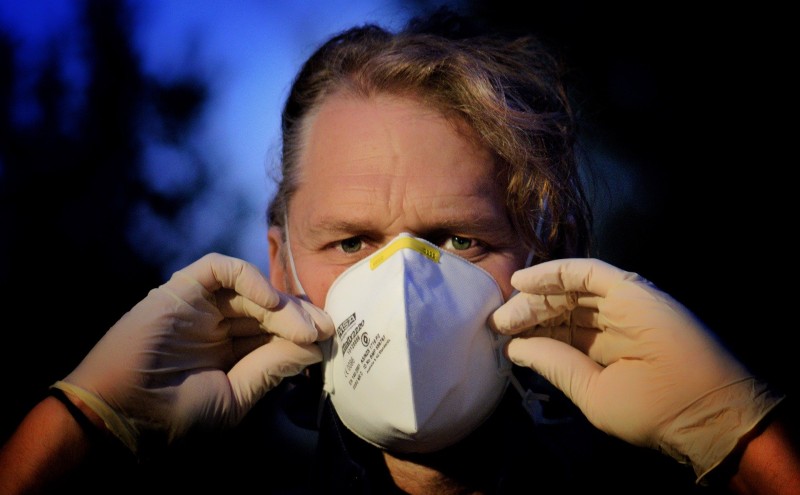Everyone’s talking about it. Coronavirus. It’s a word that was largely unheard of just a few months ago and is now dominating the airwaves. Some are concerned, others think it’s media-hype, and some are genuinely frightened for their lives as panic buying and misinformation cause consumer behavior to spin wildly out of control. Its impact on every industry, including cannabis, could be far reaching.
It’s difficult to separate fact from fiction or understand what the true impacts of a global pandemic will be. That classification was issued by the World Health Organization (WHO) on March 11, 2020.
Though the WHO reiterate the severity of such a classification, they also remind the public that this is still a disease that can be controlled and fought. “If countries detect, test, treat, isolate, trace, and mobilize their people in response, those with a handful of cases can prevent those cases becoming clusters, and those clusters becoming community transmission,” notes WHO Director-General Tedros Adhanom.
Though this illness may or may not directly impact you or your family, it will definitely (and is currently) impacting many areas of the cannabis community.
Whether you’re a consumer, an industry insider, or simply a concerned citizen, here are some of the most pressing ways in which novel coronavirus (COVID-19) is impacting the industry.
Fear Mongering

Many people are accusing the media of overstating the severity of the virus or playing up its lethality to garner clicks. Though this is certainly true in some instances, doubt and denial downplay the severity of the health and economic impacts of this disease.
Dr. Marc Owen Jones, assistant professor in Middle East Studies and Digital Humanities at Hamad Bin Khalifa University, brings up a valid concern over the media representation of the pandemic, stating, “The current business model of many news outlets, that rely on clicks to drive advertising revenues, is part of the novel coronavirus problem. The model incentivises an increased volume of articles framed in a sensationalist manner as these all generate more interest from users, and this more potential revenue. This combination of click-based revenue and the allure of fearful and sensational articles is sustaining panic and contributing to an infodemic that is fundamentally harmful to public health.”
Though many digital-news agencies and indeed, even 24-hour news channels are incentivized by clicks and ratings, the seriousness of this disease cannot be overstated.
It is not out of a desire for clicks that Italy placed its 60 million citizens under quarantine; a move which the country hasn’t implemented since a 14th-century outbreak of black plague.
It is not a ratings ploy to note that 760 million Chinese citizens, or roughly 56-percent of their country’s population, are under quarantine or travel restrictions.
Further, when you live in a country like America, where more than 27 million people do not have health insurance, there are millions of reasons to be concerned about the rapid spread of this illness.
More than hype, most agencies are reporting what they believe to be a very serious concern for their audiences. That concern doesn’t end with health, there are economic considerations as well.
Production Delays and Counterfeiting Caused by COVID-19
Remember those 760 million quarantined Chinese citizens I mentioned earlier? Well, they’re not working as much as they usually do. That means production delays, particularly for products like cannabis vaporizers.
According to recent research from New Frontier Data (NFD), cannabis companies started reporting shortages for vape hardware in February, representing a significant disruption to important industry inputs. “If China’s factories remain shuttered,” the report warns, “major aspects of the cannabis supply chain – from cultivation lighting to retail packaging – will predictably experience shortages.”
Advisors and investors are starting to weigh the impact of the virus as well, taking production delays into consideration when looking at projections for the coming year.
Alastair George, an investment strategist at Edison Investment Research, explains: “Gaps in Chinese supply chains might take up to 12 weeks to work through the system. This is likely to be replicated in every country hit by the virus. And as many industries rely on a highly international supply chain, the results could be chaotic with different components going out of stock in a staggered way – effectively crippling production for many months. The more complex the product, the longer it will take for the full impact to emerge.”
These delays raise another concern: counterfeits. Companies still have to make products, regardless of whether their supplier is closed due to the outbreak.
There is no shortage of shady characters waiting to provide these companies with what appear to be viable alternatives to their traditional vendors. Author of Supply Chain Management for Dummies Daniel Stanton is no stranger to counterfeit products. His company, SecureMarking Inc., specializes in identifying counterfeit products in global supply chains.
“Any time that there are shortages of legitimate products in the marketplace,” notes Stanton, “it creates an opportunity for counterfeiters. Companies become desperate to fill orders and may ‘relax’ their procurement rules and quality standards. That creates the risk of contaminating the entire supply chain with fake and low-quality materials, which can do even more damage than the original disruption.”
Stanton isn’t all doom-and-gloom, stating, “The good news is that most companies have a lot more inventory in their supply chains than they realize, and this acts as a shock absorber when there’s a short disruption. But the longer that the coronavirus outbreak goes, the more likely we are to start seeing shortages of all kinds of products.”
That brings us to another stumbling block in the COVID-19 pandemic, consumer behavior. Consumers don’t like words like: “shortage,” or “supply disruption,” or even “delay.”
Those words make consumers a bit panicky, clawing for supermarket toilet paper as if it were covered in coronavirus antibodies.
Consumer Behavior

This area is a bit tricky. It’s never easy to predict consumer behaviors, but there are a few key areas where the cannabis industry is likely to see an impact. Cannabis consumption is often a shared or social experience.
Joints, bowls, bongs, dabs, and vapes are often passed around the room, from friend to friend, with little concern for which friend might have recently returned from a trip abroad.
This might impact buying patterns as consumers shift from shared experiences to individual consumption patterns.
Further, those who have the option for delivery are much more likely to remain in their homes than venture out to the dispensary.
This is an ideal time to seek consumer feedback to better understand what they’re purchasing and where and with whom they’re consuming it.
Perhaps more importantly, pay attention to what they’re spending.
Consumer Spending Patterns Amid Coronavirus Concerns
Will cannabis customers lose interest in cannabis during the crisis? At least one cannabis research company doesn’t think so. “While New Frontier Data expects cannabis demand to remain stable, the shift in economic fortunes among employees who work fewer hours, lose their jobs, or face steep healthcare-related costs will lead some consumers to become much more cost-conscious,” NFD cautioned.
Reports of job losses are pouring in across the U.S. as frightened citizens stay tucked away in their homes, too scared to visit the mall or grab a coffee.
The so-called media “fear-mongering” mentioned earlier may be well-intentioned reporting, but the economic effects are sobering. “The real economic impact of the virus may be akin to terrorism and the fear it spreads,” noted George. “In times of uncertainty the mortgage will be paid for – along with food and power – but more discretionary spending is currently at risk.”
NFD predicts cost-conscious consumers will be more thoughtful than ever about bargain shopping, perhaps shying away from connoisseur selections and opting instead for more affordable products, brands, or cultivars.
NFD also foresees consumers trying to avoid high taxes, particularly in markets like California, potentially reverting to illicit suppliers to reduce their purchase costs.
Given that 70 percent of the economy is driven by consumer spending, let’s hope people start emerging from their homes and buying before the real economic effects start to hit.
Employment Considerations for the Cannabis Sector
Speaking of economic effects, what does this virus mean for employees and their families? Those in plant-touching positions may be the most impacted by business closures, as they are not able to work from home.
Their absence will also have a significant impact on production. NFD noted, “In businesses where key roles cannot be automated or operated remotely (e.g., cultivation, processing, packaging, construction, events) the inability for mission-critical personnel to get to the office may prove highly disruptive to business operations.”
Office closures mandated by executives are one component, but workers will also be self-isolating.
They may be cautious of working in close quarters or required to stay home as school closures leave them with few options for child care. Schedule disruptions are likely if not unavoidable.
Event Cancellations and Delays

Scheduling events will be difficult if not impossible during the initial stages of this outbreak as governments in the U.S. and abroad scramble to contain the disease.
Many events have already started canceling or delaying their shows.
Some notable events include: The International Cannabis Business Conference in Barcelona and Berlin (cancelled and delayed, respectively), South by Southwest in Austin (cancelled), High Times Cannabis Cup Central Valley (delayed), and the California Cannabis Industry Association annual policy conference in Sacramento (delayed).
Additionally, many of the 4/20 events scheduled for April will likely be cancelled to limit the risk of community transmission.
For those who are already abroad, like those who flew to Barcelona for the now cancelled ICBC conference, President Trump’s ban on incoming European travelers may impact your flight plans.
U.S. Citizens who are currently abroad will be permitted to return home, but may face quarantine procedures upon their arrival.
Refer to the official statement from the White House for specific details regarding who will be impacted and when.
Cannabis & Tech Today will be actively monitoring the events landscape to keep our readers up to date with the latest information regarding delays and cancellations.
We advise our audience to be mindful of their consumption patterns and hygiene procedures.
Calm, common sense, and patience will serve us well as we work together to ensure, as much as possible, a sense of normalcy and perseverance during this turbulent time.
Author
-

Patricia Miller is an executive editor at Innovative Properties Worldwide. She explores science, technology, and policy shaping the legal cannabis sector. Follow her work when you subscribe to Cannabis & Tech Today at cannatechtoday.com/subscribe/ or visit her website https://patriciamiller.squarespace.com/.






